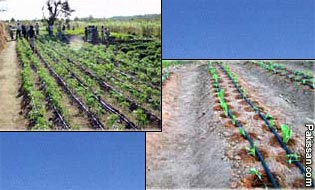|
Main Page
|
![]() |
Laser technology and irrigation efficiency
By
Bilal Hassan
THE decision of the Punjab government to provide laser
land levelling technology in every union council aimed
at curtailing wastage of irrigation water in the
province is a good move for the farming community.
Considerable quantity of water is lost during irrigation
due to uneven fields and poor farm designing owing to
unlevelled fields. It is estimated that about 20-25 per
cent water is lost during field application in the form
of evaporation and leaching thus affecting the
irrigation efficiency.
 There
are numerous factors of depletion of soil fertility and
productivity. Among others, unlevelled fields cause
significant loss of fertiliser nutrients in the process
of leaching. Irrigation water and rainwater flows toward
low lying areas along with nutrients and subsequently
moves downward. Resultantly, fertiliser use efficiency
is considerably lower in the cultivated fields.
Irrigation water that is crucial input for raising crops
is wasted contributing to poor irrigation efficiency as
well. Uneven field become less productive compared to
levelled fields. Unlevelled fields also give rise to
salinity and water-logging problems. There
are numerous factors of depletion of soil fertility and
productivity. Among others, unlevelled fields cause
significant loss of fertiliser nutrients in the process
of leaching. Irrigation water and rainwater flows toward
low lying areas along with nutrients and subsequently
moves downward. Resultantly, fertiliser use efficiency
is considerably lower in the cultivated fields.
Irrigation water that is crucial input for raising crops
is wasted contributing to poor irrigation efficiency as
well. Uneven field become less productive compared to
levelled fields. Unlevelled fields also give rise to
salinity and water-logging problems.
In this context, levelling of fields is essential to
maintain soil fertility and productivity and to save
irrigation water. Under the devised programme, the
Punjab government would provide 2,500 laser sets in
irrigated areas for the development of agriculture
sector. Another important feature of the programme is
the involvement of the private sector. Public-private
joint venture would not only improve service delivery in
this field but also contribute to capacity building of
farmers and operators for sustainable transfer of
technology to the farmer community.
It is estimated that the provision of laser units to
farmers under the programme would help curtail
irrigation application losses up to 50 per cent.
Besides, about 7.5 million acres within a period of 10
years will lead to cumulative water saving of about 5.62
million acre feet. It is an important step towards
conservation of water and land resources essential for
sustainable agriculture and food security.
Statistically, the programme will help enhance crop
yield by 20 per cent, control of water-logging and
salinity, facilitation in efficient use of agricultural
machinery and productive utilisation of seed, fertiliser
and other non-water inputs. Levelled fields ensure
uniform germination of seed. Cultural practices like
hoeing, weeding, spraying and harvesting become easier
when crop plants are of equal heights. Pre and post
harvest losses are also minimised if crop matures
uniformly.
Judicious use of inputs viz. fertilisers, irrigation,
seed, pesticides etc. is essential to bring down cost of
production. And levelling of fields would help optimise
use of these inputs and thus would contribute to
lowering of cost of production.
The Punjab government has set following main objectives
to achieve from this programme: to increase agricultural
productivity by optimising land and water resources; to
conserve land and water resources; to develop private
enterprise in rural areas, to provide agriculture
services especially laser land levelling; to enhance
cultivated area by reducing dikes and ditches; to reduce
production cost by increasing cultivation efficiency and
minimising labour for irrigation and to alleviate
poverty in rural areas through better farm returns and
employment generation.
By levelling of fields, crop harvest could easily be
enhanced that is much lesser presently owing to a number
of constraints, mainly shortage of irrigation water. It
is because unlevelled fields causing wastage of land and
irrigation water could be efficiently utilised.
Increased farm produce would help to alleviate rural
poverty that is endemic. Moreover, land levelling would
help in minimising the cost of operation, ensures better
degree of precision in much lesser time and save
irrigation water.
About 82 per cent of farming community consists of small
farmers. Accessibility of land levelling laser
technology to small farmers is as essential as to large
farmers. Depriving small farmers from this facility
would not help achieve the desired results.
Almost 22 per cent of the gross domestic product (GDP)
comes from the agriculture sector. Crops are cultivated
in irrigated as well as rain-fed areas. However,
irrigated farming is most important. Some 18.78 million
hectares of total 22.94 million hectares cropped area is
irrigated. The main sources of irrigation water are
canals and underground water pumped through tube-wells.
The Indus Basin Irrigation system is the world’s largest
integrated irrigation network that comprises three large
water reservoirs, 19 barrages, 12 inter-river link
canals, 43 irrigation canals including perennial,
annual, flood and over 107,000 watercourses.
The total length of canals is around 61,000km whereas
watercourses and farm channels measures 1.6 million
kilometres. The system drains an average of 106 MAF of
surface water each year for irrigation purpose. It is
supplemented by 43 MAF ground water pumped by means of
tube-wells per annum. But conveyance and distribution
efficiency is dismally poor. Water losses occur in huge
amount in the form of seepage, percolation and overflow.
The government is well aware of the water-related
problems confronted by agriculture sector.
Seemingly, the government has earmarked Rs66 billion for
development of water courses that is successfully under
way. Lining the watercourses would reduce seepage of
water and thus would prevent salinity and water-logging
of fields. Decision to provide land levelling laser
technology is another step towards development of farm
sector. The need is to implement the programme in letter
and in spirit.
Courtesy:
The DAWN |
|
Pakissan.com;
|
|
|